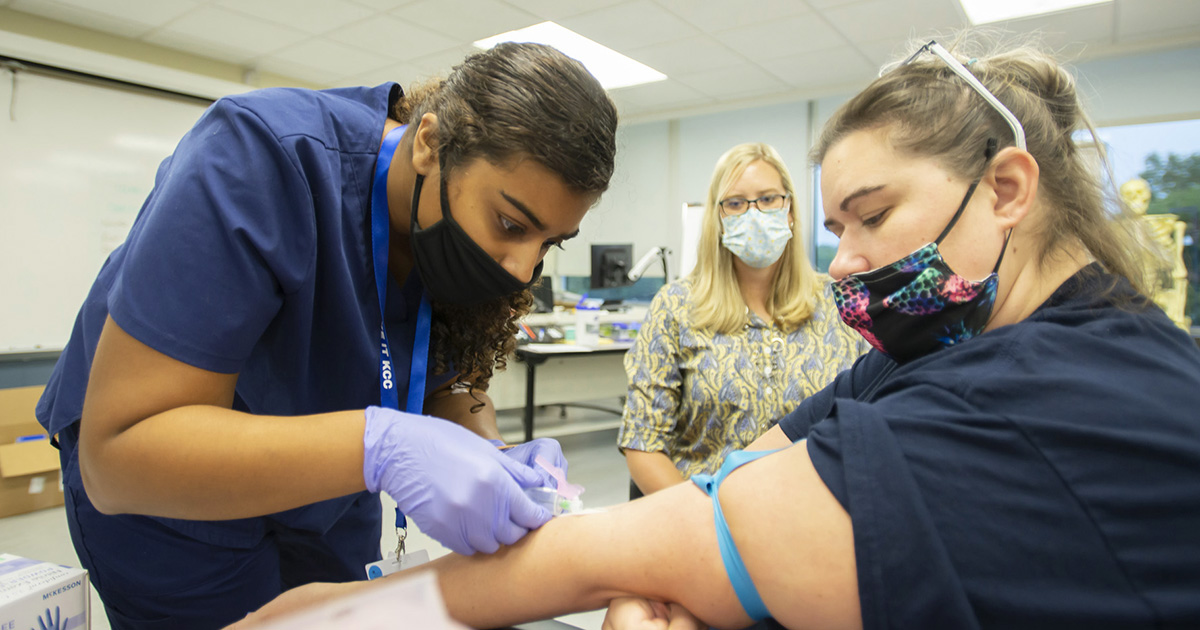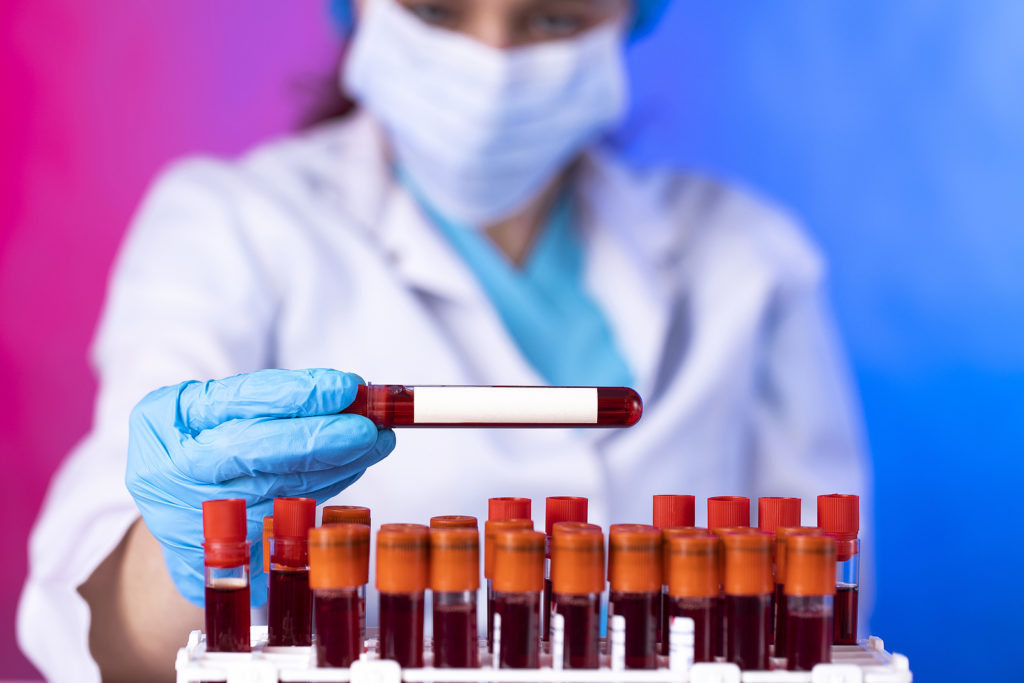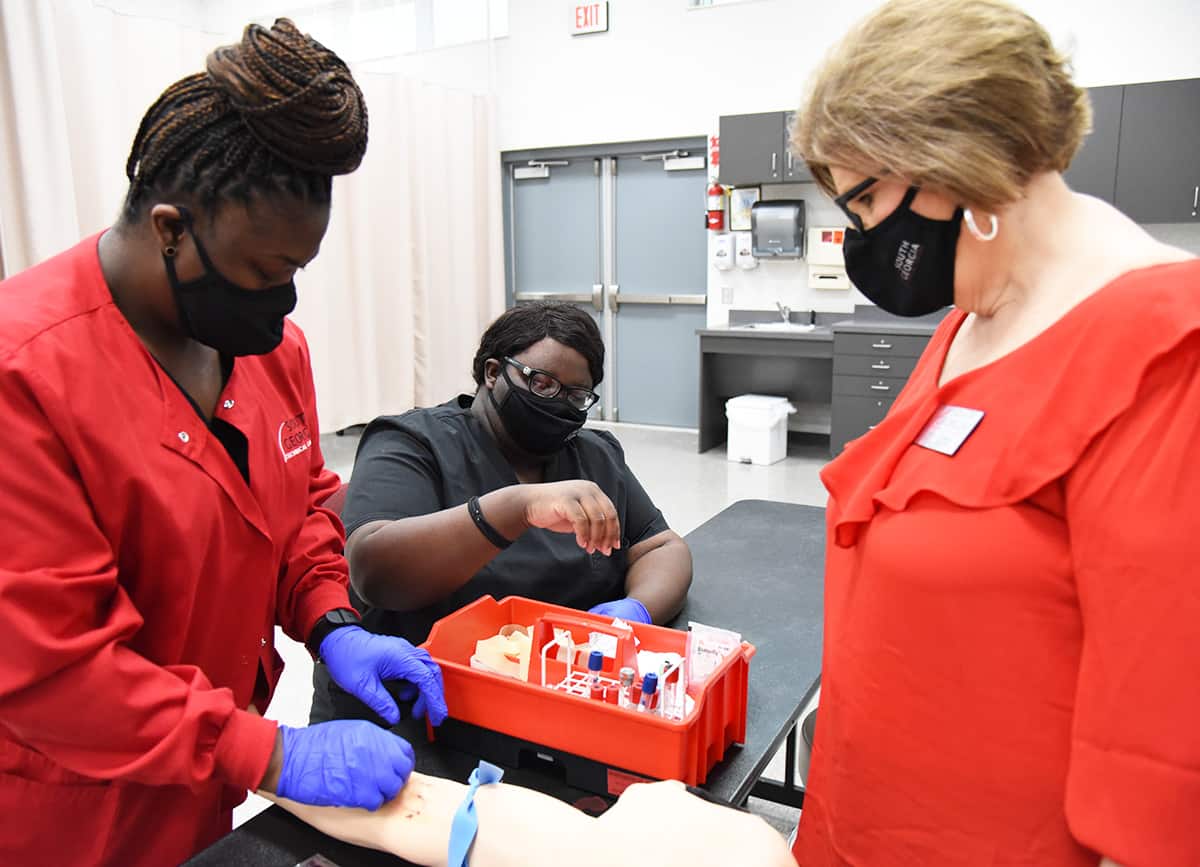Phlebotomy school Success: A Student’s Guide to Excelling in Class and Clinic
Phlebotomy school Success: A Student’s Guide to Excelling in Class and Clinic
Blog Article
The Course to Qualification: Recognizing the Phlebotomy Educating Course Trip and Its Relevance
As you consider the course to certification in phlebotomy, it's crucial to understand the duty you'll play in healthcare. Your training will certainly cover important abilities, from blood collection methods to patient interaction.

The Function of Phlebotomists in Medical Care
Phlebotomists play an essential duty in the medical care system, acting as the vital link between clients and important diagnostic testing. You'll carry out blood draws, making certain examples are collected properly and securely. Your knowledge helps in detecting clinical conditions, keeping an eye on health, and leading therapy choices.
In your daily communications, you'll need to develop trust with patients, making them feel comfy throughout what could be a difficult experience. You are accountable for classifying and handling samples carefully to avoid contamination or mistakes, which might affect examination outcomes.
Past this, you'll usually function alongside physicians and nurses, interacting vital details about people' conditions. By grasping your abilities, you add meaningfully to person treatment, making you an indispensable part of the clinical group.
Introduction of Phlebotomy Training Programs
When checking out phlebotomy training programs, you'll discover various types designed to fit various routines and discovering styles. Each program helps you create crucial abilities like blood collection and client interaction. Understanding these alternatives is crucial to selecting the best path for your job.
Kinds of Training Programs
A number of types of training programs are readily available for those looking to become skillful in phlebotomy. Furthermore, some hospitals and facilities use on-the-job training programs, giving useful experience while you learn. Whatever path you choose, each program aims to furnish you with the necessary skills for an effective phlebotomy profession.

Key Abilities Created
Understanding phlebotomy calls for a collection of crucial abilities that are developed through complete training programs. You'll discover technical abilities like appropriate capillary option, needle insertion, and blood collection methods. These hands-on practices assure you can perform procedures securely and effectively. Furthermore, communication skills are essential; you'll need to communicate with clients, describe treatments, and put them comfortable. Recognizing anatomy and physiology is important, also, as it aids you locate blood vessels and understand the body's action to blood draws. Ultimately, you'll acquire expertise of security procedures and infection control, guaranteeing you preserve a clean and sterile atmosphere. Each of these skills is important for your success as a qualified phlebotomist, making you a beneficial asset in any health care setting.
Key Parts of a Phlebotomy Course
In a phlebotomy program, you'll concentrate on crucial subjects that prepared for your future career. You'll involve in hands-on training that enables you to use what you have actually found out in real-world setups. Both the curriculum and functional experience are important for your success as a phlebotomist.
Curriculum Review
While seeking a phlebotomy training course, you'll encounter a curriculum created to equip you with essential abilities and knowledge. Phlebotomy Training Course. This educational program commonly consists of anatomy and physiology, concentrating on the circulatory system and understanding blood components. You'll also learn around different kinds of blood collection techniques, including venipuncture and capillary slit methods
Additionally, infection control and safety methods are crucial parts, guaranteeing you understand just how to keep a clean and sterile environment. You'll examine patient interaction, stressing communication and empathy, which are essential for easing patient anxiety. Lastly, moral and legal considerations will certainly be addressed, preparing you for real-world responsibilities. This fundamental understanding will certainly allow you to excel as a phlebotomist and provide high quality treatment in professional settings.
Hands-On Training Experience
Getting hands-on experience is a vital component of your phlebotomy training program. This sensible training enables you to use what you've found out in a real-world setup, boosting your abilities and confidence. You'll exercise venipuncture strategies, learn exactly how to manage different sorts of specimens, and get acquainted with the devices made use of in the area. Under the support of skilled trainers, you'll refine your skills, guaranteeing you're prepared for any kind of situation you could encounter.
Furthermore, you'll get the opportunity to engage with individuals, which is important for establishing your interaction abilities. This combination of technical efficiency and interpersonal abilities is critical for your success as a licensed phlebotomist. Ultimately, hands-on training is where concept fulfills practice, solidifying your expertise and readiness for certification.
Certification and Licensing Demands
Prior to you can begin your profession in phlebotomy, it is vital to comprehend the accreditation and licensing requirements that vary by click here now state. Most states need phlebotomists to hold a qualification from a recognized organization, such as the National Phlebotomy Association or the American Society for Scientific Pathology. These qualifications commonly entail passing a test that examines your expertise and abilities in the field.
In addition to accreditation, some states have particular licensing demands. You may require to finish a particular variety of hours in medical method, submit evidence of training, or undertake a history check. It is necessary to research your state's regulations to make certain you meet all necessary standards.
Remaining educated concerning these needs not just assists you protect a setting but also enhances your trustworthiness as a professional. By fulfilling these needs, you'll be well on your means to an effective occupation in phlebotomy.
Hands-On Training and Practical Experience
Hands-on training and useful experience are vital components of your phlebotomy education and learning, as they permit you to apply theoretical expertise in real-world circumstances. During your training, you'll engage in monitored venipuncture, discover proper strategies, and come to be acquainted with various blood collection tools. This direct involvement is essential for constructing your confidence and honing your abilities.
You'll work very closely with knowledgeable professionals that can direct you through the subtleties of client communication and sample handling. Each session not just reinforces your understanding yet also prepares you for the busy atmosphere of healthcare setups.
Additionally, lots of programs incorporate scientific rotations, permitting you to experience diverse setups, from healthcare facilities to outpatient clinics. This direct exposure helps you adapt to various difficulties and person requirements, guaranteeing you're well-prepared for your future role. Accept these opportunities, as they're vital to becoming an experienced and compassionate phlebotomist.
Obstacles Faced During Training
While gaining hands-on experience is necessary, it's important to identify the challenges that can occur throughout your phlebotomy training. You might experience anxiousness when carrying out treatments on real individuals, specifically if you're new to the atmosphere. The stress to obtain everything right can be overwhelming. Additionally, grasping the abilities needed for blood draws takes method; you might fight with method at first.
Time monitoring can also be a hurdle, as balancing theory, useful sessions, and individual dedications can really feel challenging. You might face varying finding out rates among your peers, resulting in sensations of insecurity if you assume you're dropping behind. Finally, adjusting view publisher site to the different personalities of trainers can be tough, as each might have an one-of-a-kind training design.
Identifying these challenges at an early stage can prepare you for success and help you establish durability throughout your training trip.
Occupation Opportunities After Qualification

As you acquire experience, you might also think about concentrating on areas like pediatric or page senior citizen phlebotomy, satisfying details person requirements. Some phlebotomists pick to advance their careers by coming to be laboratory technicians or going after additional education and learning in healthcare areas.
In addition, your qualification can cause duties in training or overseeing new phlebotomists, allowing you to share your expertise. With the health care market consistently expanding, your abilities will always be in demand, leading the way for a stable and fulfilling job. Accept the opportunities awaiting you!
Regularly Asked Inquiries
What Is the Regular Duration of a Phlebotomy Training Training Course?
Phlebotomy training programs typically last around four to eight weeks. You'll take part in hands-on method, classroom direction, and on the internet understanding. Finishing this training prepares you for qualification and a rewarding career in healthcare.
Are Online Phlebotomy Courses Available?
Yes, online phlebotomy courses are available. They provide flexibility and convenience, allowing you to study at your very own rate. Simply validate the program is recognized to satisfy qualification requirements and acquire valuable abilities for your job.
Just How Much Does Phlebotomy Training Commonly Expense?
Phlebotomy training normally sets you back between $700 and $2,500, depending on the program and area. You need to think about elements like training course size, included products, and hands-on experience when selecting the right training for you.
What Are Common Prerequisites for Phlebotomy Training?
Typical requirements for phlebotomy training typically consist of a high school diploma or GED, immunizations, and a background check. Some programs might additionally call for fundamental healthcare understanding or certifications, ensuring you're planned for hands-on training.
Can I Function While Finishing My Phlebotomy Training?
Yes, you can function while completing your phlebotomy training. Many pupils balance tasks with their researches, however make certain to manage your time efficiently to guarantee you fulfill both job and training dedications efficiently.
Report this page